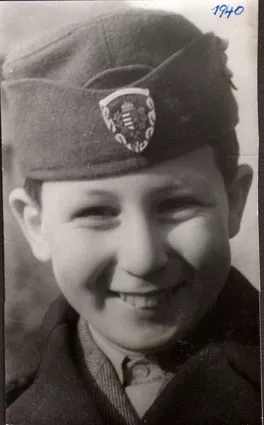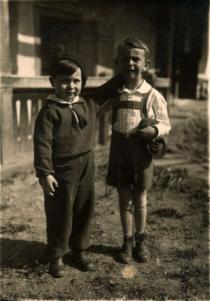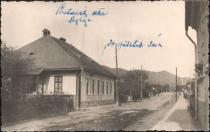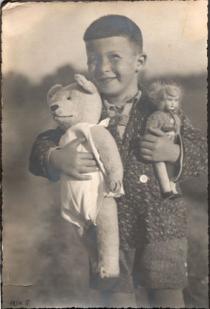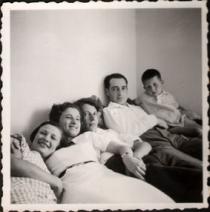This is me [Janos Gottlieb] with a levente cap.
During the Romanian era, before 1940 I was a ‘strajer’ [guard] - I have a photo related to this as well [see photo rojgo014] -, then, after the Romanians withdrew and the Hungarians came in, I became a levente.
This is history. My father [Laszlo Gottlieb] took the photo in 1940, in Nagybanya.
I was born in 1929 in Nagybanya. In fact I didn't get any particular Jewish education, I received a rather Hungarian education at home as well.
I didn't learn to speak Hebrew, I don't speak at all. Unfortunately. It's a good thing to know one more language, but that was it.
A visiting teacher taught me to read in Hebrew, but I never understood what I was reading.
He used to come to us when I was around eight years old until I became twelve, for three or four years, but only once in a week.
Everybody spoke Hungarian with me in the family. My mother tongue is Hungarian, I didn't speak any other language until the age of five.
Later my father, who obviously had a German education, hired a fraulein for me, according to the customs of those times, and that's how I learnt German.
I think I was five, this was after my mother died. And I got to learn Romanian only when I was six and a half, when my father simply enrolled me to a Romanian school saying: 'You have to learn Romanian, because we live in Romania.'
And he was right. In Nagybanya there wasn't any Jewish school, only a cheder.
There was a Hungarian school belonging to the Calvinist church, but he didn't send me there.
So I finished primary school in the Romanian public school. I finished four years of primary school in Romanian, one year of gymnasium, then in the 1940s Hungarians came in, and after that I learned in Hungarian, then at the university too.
God knows how it worked back then, but I did have all kind of friends: Jews - but just a few -, Hungarians, Romanians.
We got along well with everybody, we mixed with everybody; nationality or religious affiliation didn't mean a problem.
Nationality and religion was everyone's own business.
Especially after I learnt Romanian at the age of six, being in contact with Romanian children didn't have any obstacles.
I was very distressed when I saw they were instigating people of different nationality against each other - for this is the truth.
I experienced incitement in my childhood already.
There were Hungarians, who were against Romanians, and Romanians, who didn't like Hungarians.
I don't know why, because one can not be against one nation. You can be against a person, yes, but not against a nation.
That's it. And anti-Semitism started to be present in the 1940s, I was already eleven years old.
I had Hungarian friends, I even had friends who came to Nagybanya from Hungary, when North-Transylvania belonged to Hungary, and I got along well with them too, there wasn't any problem.
I couldn't say they were anti-Semite. However, there were people who always talked badly of Jews.
For example it was the manifestation of anti-Semitism, that after the Germans came in - this was already in 1944 -, we had to wear yellow stars.
Then they gathered us into ghettos. Now who took us into the ghettos? The Hungarians. What can I say?
I wrote down in my memoirs that they had lodged two German officers in our house.
[Ioan Gottlieb: Euch werde ich`s noch zeigen (I'll show you) - Herausgegeben von Erhard Roy Wiehn, Hartung-Gorre Verlag, Konstanz, 2006]
We had four rooms, and in those times the army used to rent rooms for the officers.
We didn't have any problems with them. The truth is that they didn't even talk to us.
They weren't SS officers, but Wehrmacht officers, there's a big difference. So there were two officers.
They had an orderly too, a German soldier, who didn't live there, but came each morning.
I don't know what he was doing for them. He was a young boy, not much older than me.
We became friends. He was German, I speak German well, he chatted with me, we played together…
Well, we didn't play childish games, we talked in the garden, things like that.
There wasn't any problem. When they were gathering us into the ghetto, first they took us to a truck, where everybody from the surroundings was forced to get up.
This truck stood at the end of the street, not far from our house. The orderly wasn't there when they took us away.
But he arrived home and found out what had happened.
He ran after us, found me in the truck, we hold hands, and he wished me all the best. Not all the Germans are anti-Semite.
Human relationships are complicated, very complicated.
